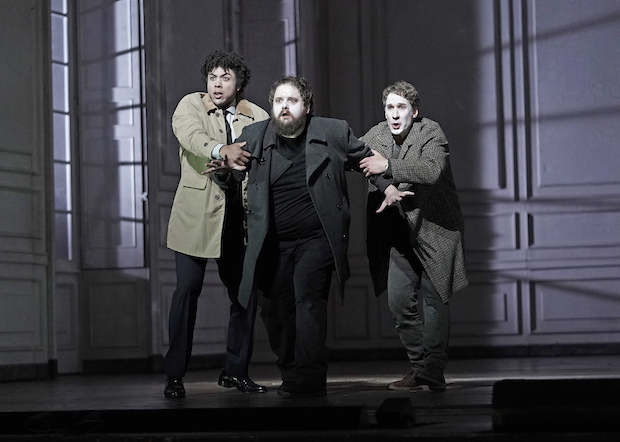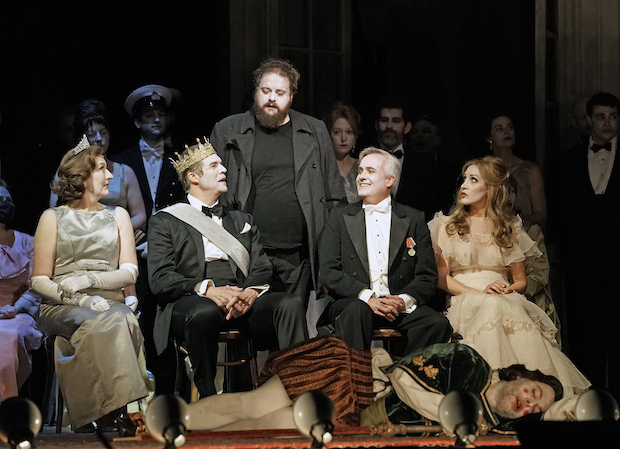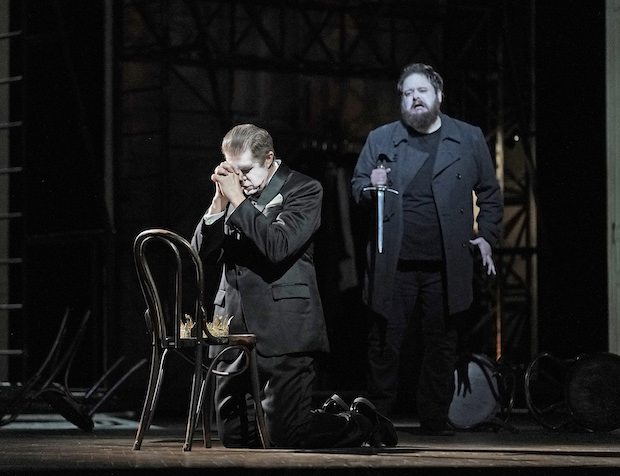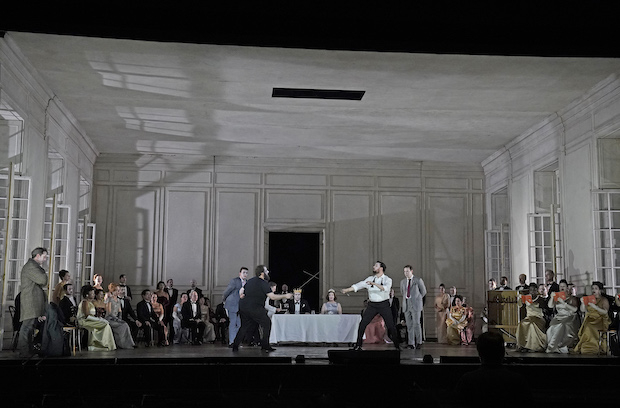Review: A Dark New Hamlet at the Metropolitan Opera

(© Karen Almond / Met Opera)
What is it that attracts opera composers to Shakespeare? Is it the grandly drawn characters? Their tendency to soliloquize (perfect for an aria)? Is it the consistently high body count? Or cynically, is it just the name brand recognition?
Whatever it is, Shakespeare's plays have provided rich source material for the opera repertory: Purcell's The Fairy-Queen, Gounod's Roméo et Juliet, and Verdi's trifecta (Otello, Macbeth, and Falstaff). Add to the list the latest, Brett Dean and Matthew Jocelyn's Hamlet, now making its North American debut at the Metropolitan Opera following a world premiere at Glyndebourne in 2017. It's one of the better adaptations of the tale of the melancholic Dane I've seen, and at just over three hours, considerably shorter than a full staging of Shakespeare's text (the forthcoming production at Park Avenue Armory promises to be four hours long).
This isn't the first time Hamlet has been turned into an opera: French composer Ambroise Thomas adapted it in 1868, and that version has appeared at the Met as recently as 2010. This newer adaptation adheres more closely to the original story, and since it is in English, it sets Shakespeare's actual language (heavily trimmed and rearranged) to an arresting, unnerving new score for our present moment.
I've long felt that Hamlet is, among other things, about the conspiracy of the old against the middle-aged, something that both Gen-Xers and aging Millennials ought to appreciate when political and economic power is still largely wielded by the members of the Baby Boom generation. Really, why is it that when the old King dies, he isn't immediately succeeded by his son, Hamlet (Allan Clayton)? Instead, Queen Gertrude (Eve Gigliotti) quickly remarries the King's brother, Claudius (Rod Gilfry), who becomes the new King. Hamlet is distraught, but when he is visited by the ghost of his father (John Relyea), he vows revenge. Of course, being the tragic intellectual that he is, Hamlet doesn't run straight to the armory, but the theater, concocting an elaborate scheme to use a band of traveling players to provoke a murder confession from his uncle-father.

(© Karen Almond / Met Opera)
Dean makes no secret about where we are headed with a score that is intensely dramatic from the first note. The entire string section seems to creep along the backs of our necks as a nightmarish chorus emanates from the stage, and occasionally from places we cannot see in the house.
Conductor Nicholas Carter has cleverly annexed to the orchestra the six dress circle boxes closest to the stage, so that suspicious woodwinds sneak up on us from above. At one point, the fading patter of a snare in one of these boxes seemed to represent the sound of Ophelia's sanity galloping away. Uncommon instruments made from sandpaper and marble in bowls create further creaks and bumps, resulting in a cinematic, schizophrenic experience that makes us feel Hamlet's paranoia.
Opera traditionalists expecting a 21st century version of Verdi will be disappointed. (But really, who expects that anymore?) There is no "To Be or Not to Be" set-piece, and when that line is first uttered, it is only the back half (to give you a sense of the overwhelming gloom of this adaptation). Chances are you won't leave humming a catchy theme, nor will many of these numbers make it into the recital binder. But in every moment, Dean's music and Jocelyn's libretto serve the story, which never stops churning forward.

(© Karen Almond / Met Opera)
Clayton drives much of this action in his convincing portrayal of a midlife crisis that is both royally specific and deeply relatable. Scruffy, sweaty, and clad in dumpy black clothes (consistently smart costumes by Alice Babidge), he's like Slavoj Žižek with a lovely, crisp tenor.
There are other standout performances: Baritone Gilfrey makes a weaselly, self-pitying Claudius. Gigliotti lends an authoritative mezzo to Gertrude so that we understand why the court followed her lead to Claudius. Bass-Baritone Relyea resonates in three roles: the Ghost, the First Player, and the Gravedigger. In the opera's one bit of levity, Daniel Moody and Eric Jurenas make memorable Met debuts as the smarmy Rosencrantz and Guildenstern, both voiced in falsetto. And Brenda Rae delivers an unsettlingly raw Ophelia, who seem in danger from the beginning, and gets considerably worse off from there.
Director Neil Armfield has created a bleak world for them to inhabit, with a set that embraces the artifice of theater, both on the stage and at court (design by Ralph Myers). Walls rapidly spin around, revealing a stately Victorian banquet hall to be nothing more than a series of moving set pieces, a perfect backdrop for the players. Jon Clark's moody lighting illuminates the pale faces of this ghostly place, which seems frozen in time.

(© Karen Almond / Met Opera)
The chorus is another great benefit the opera gives to Hamlet: While the age of supernumeraries in the non-musical theater is long past, with smaller and smaller casts doubling and tripling just to fill the named roles, the Met chorus is able to convey the enormity of the court of Elsinore: Always watching, always judging, and occasionally shrieking its disapproval, the chorus raises the stakes, which are not limited to one unhappy family, but represent the disintegration of the entire ruling class. Frankly, I was surprised when Fortinbras didn't show up at the end to claim this land for Norway.
Hamlet may be educated and intelligent, but it's no wonder his elders have conspired to deny him his birthright: Just when action (specifically, murdering Claudius) might have been most useful, he backs off with a lame theological excuse. That's what all that Wittenberg tuition money bought you, Hamlet's dad. Revolutionary for its day (and sadly still relevant), Hamlet makes a very convincing argument against inherited power.











